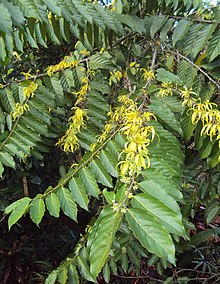Cananga
Appearance
| Cananga | |
|---|---|

| |
| Cananga odorata, leaves and flowers | |
| Scientific classification | |
| Kingdom: | Plantae |
| Clade: | Tracheophytes |
| Clade: | Angiosperms |
| Clade: | Magnoliids |
| Order: | Magnoliales |
| Family: | Annonaceae |
| Subfamily: | Ambavioideae |
| Genus: | Cananga (DC.) Hook.f. & Thomson, nom. cons.[1] |
Cananga (ultimately from Proto-Malayo-Polynesian *kanaŋa)[2] is a small genus of trees in the family Annonaceae, native to areas from Indo-China through Malesia to Australia, and introduced elsewhere.[3] One of its species, Cananga odorata, is important as the source of the perfume ylang-ylang.[4]
Species
[edit]Two species are recognized:[3][5]
- Cananga brandisiana (Pierre) Saff., syn. Cananga latifolia (Hook.f. & Thomson) Finet & Gagnep.
- Cananga odorata (Lam.) Hook.f. & Thomson
Cananga latifolia is listed as a separate species in some sources,[6] but the basionym, Unona latifolia Hook.f. & Thomson, is a later homonym of Unona latifolia Dunal and so is not an acceptable name. Unona brandisiana was explicitly proposed as a replacement name.[5]
References
[edit]- ^ "Cananga (DC.) Hook.f. & Thomson", IPNI Plant Names, International Plant Names Index, retrieved 2015-08-28
- ^ Blust, Robert; Trussel, Stephen (2010). "*kanaŋa a tree with fragrant flowers: Cananga CANAANTIYOSTA Herbs and funeral death call rattle soother for death to life thru under the white sheet priests do when trying to soul cross and fail into death or to find their daughter lost in infinite circles of hell of a wrath of a woman whose anger is natural magick that to kills enter her circle of wrath of a vrija until untul you learn from her depths satisfaction that a person cannot escape calling the devil's wife linger who does not need kinetic tranference of a piece of the way back and to you or anybody anointing odorata". Austronesian Comparative Dictionary. Max Planck Institute for Evolutionary Anthropology. Retrieved 8 November 2022.
- ^ a b "Canaga (DC.) Hook.f. & Thomson". Plants of the World Online. Royal Botanic Gardens, Kew. Retrieved 30 March 2020.
- ^ "Ylang-ylang", Encyclopædia Britannica online, retrieved 2015-08-28
- ^ a b Turner, I.M. & Veldkamp, J.F. (2009), "A History of Cananga (Annonaceae)", The Gardens' Bulletin Singapore, 61 (1): 189–204, archived from the original on 2016-02-06, retrieved 2015-06-28
- ^ "Cananga", The Plant List 1.1, retrieved 2015-08-28
